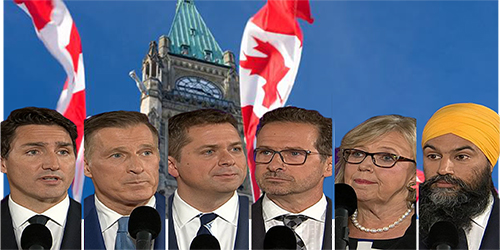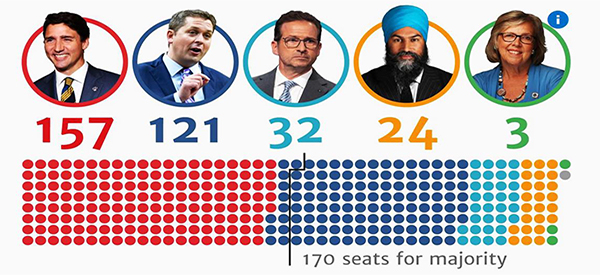Federal election 2019 Result: Trudeau's Liberals wins to lead a minority government.
Federal Election Results Update

In the recent Federal election, Canadians elected a minority government led by Justin Trudeau and the Liberal Party. They sent a clear message that no party earned enough public trust to get a full mandate for the future of Canada. Justin Trudeau and the Liberal Party maintain power. The Conservatives increased their seats in Parliament but finish behind the Liberals by over 30 seats. That result was mainly driven by the regional concentration of votes, with the Conservatives winning the popular vote nationally. The Conservatives won by huge margins across the Prairies and the Liberals spread their support across regions, with a strong showing in major urban centres like Toronto, Montreal and Vancouver.
|
|
|
The breakdown of seats looks to give the Liberals enough strength that they will not have to establish a formal coalition to govern, however they will need to work with the other parties to pass important legislation. It appears that with the expensive toll of the campaign, and limited fundraising, the NDP will have very little incentive to fight another campaign in the near future. |
 |
The Bloc Québecois resurgence and momentum over the course of the campaign changed the political landscape. As it stands, they won 32 seats in Quebec, more than enough to give them official party status and position them as an important player in the new Parliament. The NDP, for all the hype surrounding leader. |
Jagmeet Singh, lost more than a dozen seats, falling back to their fewest number of seats since 2004, along with a smaller share of the popular vote.
The story of the campaign may be the intense divisions, both between regions and political viewpoints that have emerged. It remains to be seen if it will be Justin Trudeau who bridges those gaps over the months ahead, and where his opponents will stake out ground.
Over the past 40 days, campaigns jockeyed for position in 338 ridings from coast-to-coast-to-coast. Parties on the left and the right offered voters starkly different versions of what the future of our country can and should be.
For the RV industry, the new power dynamic in Ottawa brings opportunities and challenges. It provides a unique opportunity for meaningful engagement with all political parties on issues of concern to our industry. In this minority government scenario, grassroots engagement becomes even more crucial to our advocacy goals.
The main challenge would be the impact of the concessions on environmental and taxation policies the Liberals would have to make to the NDP and the Greens for their support to govern. The RV industry will have to push back on potential tax hikes and increased red tape on small businesses.
On the policy front, the election results and the lost seats might be enough to pull the Liberals back from wild promises that included a 10 percent luxury tax on cars over $100,000, which as it stands does not include recreational vehicles. It is also safe to assume that the new government will move to complete the ratification of the North-American trade deal with the support of the Conservatives.
In the coming weeks, RVDA will actively work to educate all new members of Parliament on the challenges faced by our industry and the importance of the RV sector to Canada’s economy.
